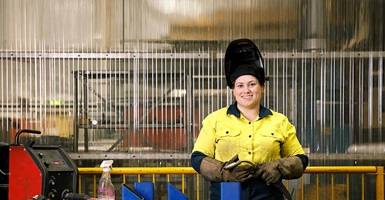If you would like to make a positive difference in the lives of older Australians, a career in aged care could be for you.
As one of our largest service industries, the aged care sector plays a vital role in providing people with a range of care options in the later stages of their lives. And it’s aged care workers who have the most important job – taking care of the emotional, social and physical wellbeing of their clients.
From an employment point of view, very strong future jobs growth has been forecast for aged and disabled carers. Chisholm Institute of TAFE aged care educator Gayle Evangelista says there will most likely always be jobs available. However, she also says the work is incredibly rewarding.
“It’s an amazing experience to work in aged care. To assist the elderly, aged and frail is wonderful. It’s also very rewarding when family members thank you for everything you do to help their loved one,” Gayle says.
Here’s what you need to know about a career in aged care:
What attributes do you need?
To work in aged care you’ll need to be patient, flexible and understanding, with a supportive and caring nature. You’ll also need to have good communication skills, be able to work as part of a team, and be genuinely committed to respecting the rights of the elderly.
What is the day-to-day work like?
Aged care workers may perform many duties, ranging from personal tasks such as washing, dressing, and feeding, through to assisting with self-medication. Domestic duties may include cooking, cleaning, washing, ironing and other household chores. Sometimes you’ll need to provide social and emotional support, and accompany clients on outings.
You could also find yourself developing and implementing care programs for those in residential facilities or implementing appropriate strategies for managing problems related to dementia.
You’ll also play a key role working with, and managing relationships with, a team of health professionals, family, friends and other carers.
What are the challenges?
While working in aged care can be extremely rewarding, it can also be emotionally and physically challenging. You’ll be working with people who are dealing with their own unique challenges — some of them physical, and some of them emotional.
“Another key challenge is keeping up with legislative changes,” says Gayle. “I believe the Royal Commission into Aged Care will lead to even more legislative changes.”
What career paths can you take?
Gayle says that on completion of a Certificate III in Individual Support – Ageing (CHS33015) you’ll be able to work in a residential aged care facility, or provide in-home care.
“You may also have the option to work for an agency, which provides you with flexible work arrangements to suit your lifestyle,” she says.
A career in aged care can open up many career opportunities. For example, you can work directly with the elderly, assisting them on a daily basis, or work your way towards a more administrative, managerial role.
“This qualification can be an invaluable tool for anyone who wants to pursue a career in health care,” Gayle says.
“It’s also a great learning space for those who want to move into nursing. It gives them a chance to consolidate their skills, and move into their nursing course feeling more empowered.”
There is also a Certificate IV in Ageing Support (CHC43015), which is an extension of what you learn from the Certificate III course. This will enable you to work with those who require more complex management and special assistance, and to liaise with health care professionals about patients in their care.
Both these courses are included in the Free TAFE for Priority Courses program, which reduces the financial barrier for students wanting to train in courses that lead to jobs in demand from Victorian employers.


